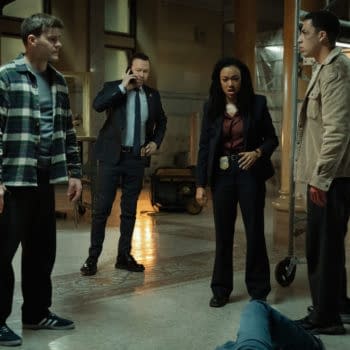Posted in: BBC, Doctor Who, TV | Tagged: bbc, chris chibnall, doctor who, Doctor Who: Flux, jodie whittaker, john bishop
Doctor Who: Flux Lets Chibnall Be Chibnall; We Want to Party with BBCA
Doctor Who: Flux had a US-UK simulcast, broadcasting on BBC America and BBC One at the same time with a time-lag where the US broadcast stuck in ad breaks. The ads were more shocking and surprising than anything in the episode. Doctor Who: Flux is the most Chris Chibnall of his entire run. You have to think about how in many ways Chibnall is the ultimate old-school TV writer: his approach to storytelling is to pile PLOT upon PLOT upon PLOT to keep the viewer on their toes and constantly paying attention. There is no chance of getting bored here.

Characterisation is secondary in the PLOT style of screenwriting. Here Chibnall is In his element, throwing all kinds of plot at the wall hoping some of it will stick and hoping the viewer never gets bored. The first episode of Flux is all about set-up. It keeps jumping from one new character and set up to another to show what's coming for the rest of the 6-episode season. Chibnall's style as a writer is generally to use what's been used many times before, including on other shows, and to keep throwing in moments and tropes at such speed that no one has time to complain as long as the story keeps racing along at breakneck speed.
Doctor Who: Flux – PLOT! PLOT! PLOT!
This might run against the current model for TV. People invest in shows because they love the characters, not the plot. Chibnall became the hottest showrunner in the UK because he had a massive hit creating and running Broadchurch, which hooked viewers on a neverending series of twists and turns in its plot. Chibnall was also showrunner on Law and Order UK, which starred Bradley Walsh in the grizzled cop role occupied by Jerry Orbach in the US original, and that was a show where every episode was based on well-timed tropes. The biggest flaw in Doctor Who: Flux and the rest of Chibnall's run is his tendency to sideline the Doctor in her own show. For a show called "Doctor Who", Chibnall turned the Doctor into a supporting character in her own show, preferring to spend a lot more time on the mundane soap opera arc of Graham (Bradley Walsh) and Ryan (Tosin Cole), which was so bereft of Science Fiction it might as well have been an arc on Emmerdale or Brookside.
In the premiere of Flux, Chibnall is once again much more comfortable spending as much time away from The Doctor as possible, preferring to set up Dan (John Bishop), who's instantly more funny and relatable than the Doctor. Jodie Whittaker has always been a good Doctor, but Chibnall gives her very little to do, reducing her to a series of wisecracks, ticks, and tropes rather than the fully-realised character that Russell T. Davies and Steven Moffat created. This is why even though Whittaker's run is coming to an end, her Doctor still feels incomplete. We still barely know her despite the "Timeless Child" retcon arc. That arc is another part of Chibnall's plot-driven style. It's part of the "everything you thought you knew about the hero is wrong!" trope from comics that weren't invented but elevated by Alan Moore, and Chibnall only takes from the best.
So About Those Ads, BBC America…
It's odd to realise that the adverts indicate that BBC America doesn't consider Doctor Who a children's show but an international prime time show. The ads were for upmarket items like the just-launched Google Pixel 6 phone, Bailey's, and… Botox. Bailey's?! A liquor?! And Botox?! For a children's show?! While the show was on in the evening in the UK while the kids were out trick-or-treating, it was on during the afternoon in the US. So the adults watching during the day would be encouraged to do some day-drinking and then get some Botox injections? That's a Science Fiction universe as weird as any in Doctor Who right there.














